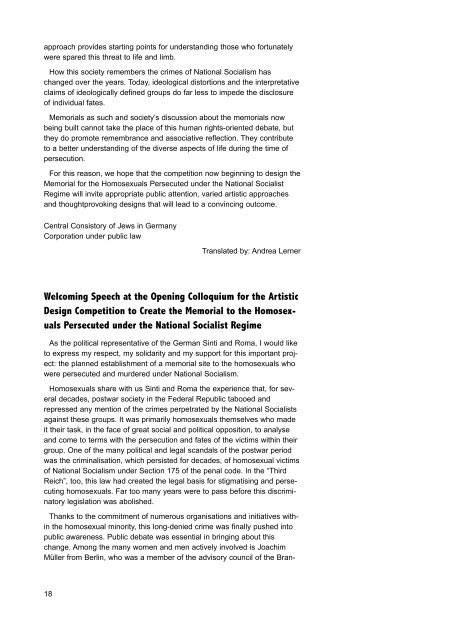Download PDF - Gedenkort für die im Nationalsozialismus ...
Download PDF - Gedenkort für die im Nationalsozialismus ...
Download PDF - Gedenkort für die im Nationalsozialismus ...
Erfolgreiche ePaper selbst erstellen
Machen Sie aus Ihren PDF Publikationen ein blätterbares Flipbook mit unserer einzigartigen Google optimierten e-Paper Software.
approach provides starting points for understanding those who fortunatelywere spared this threat to life and l<strong>im</strong>b.How this society remembers the cr<strong>im</strong>es of National Socialism haschanged over the years. Today, ideological distortions and the interpretativecla<strong>im</strong>s of ideologically defined groups do far less to <strong>im</strong>pede the disclosureof individual fates.Memorials as such and society’s discussion about the memorials nowbeing built cannot take the place of this human rights-oriented debate, butthey do promote remembrance and associative reflection. They contributeto a better understanding of the diverse aspects of life during the t<strong>im</strong>e ofpersecution.For this reason, we hope that the competition now beginning to design theMemorial for the Homosexuals Persecuted under the National SocialistReg<strong>im</strong>e will invite appropriate public attention, varied artistic approachesand thoughtprovoking designs that will lead to a convincing outcome.Central Consistory of Jews in GermanyCorporation under public lawTranslated by: Andrea LernerWelcoming Speech at the Opening Colloquium for the ArtisticDesign Competition to Create the Memorial to the HomosexualsPersecuted under the National Socialist Reg<strong>im</strong>eAs the political representative of the German Sinti and Roma, I would liketo express my respect, my solidarity and my support for this <strong>im</strong>portant project:the planned establishment of a memorial site to the homosexuals whowere persecuted and murdered under National Socialism.Homosexuals share with us Sinti and Roma the experience that, for severaldecades, postwar society in the Federal Republic tabooed andrepressed any mention of the cr<strong>im</strong>es perpetrated by the National Socialistsagainst these groups. It was pr<strong>im</strong>arily homosexuals themselves who madeit their task, in the face of great social and political opposition, to analyseand come to terms with the persecution and fates of the vict<strong>im</strong>s within theirgroup. One of the many political and legal scandals of the postwar periodwas the cr<strong>im</strong>inalisation, which persisted for decades, of homosexual vict<strong>im</strong>sof National Socialism under Section 175 of the penal code. In the “ThirdReich”, too, this law had created the legal basis for stigmatising and persecutinghomosexuals. Far too many years were to pass before this discr<strong>im</strong>inatorylegislation was abolished.Thanks to the commitment of numerous organisations and initiatives withinthe homosexual minority, this long-denied cr<strong>im</strong>e was finally pushed intopublic awareness. Public debate was essential in bringing about thischange. Among the many women and men actively involved is Joach<strong>im</strong>Müller from Berlin, who was a member of the advisory council of the Bran-18


